My early childhood, in hindsight, seemingly coincided with television's increased efforts to make children's programming educational, aiming for "edu-tainment", as was often stated. But every so often, a series will come along and get so much right that people are realizing the positive effect it has had on them even decades later.
Adapted from Marc Brown's popular Arthur picture book series (starting with Arthur's Nose in 1976), Arthur premiered on PBS on October 7, 1996. Initially a co-production between PBS affiliate WGBH Boston and Montreal-based film and television company Cinar, Arthur combined the mandated "lessons" with character humor, excellent voice acting, and bouts of random, absurd humor that were likely the basis for this writer's humorous leanings today.
Believe it or not, the above makes less sense in context than out of it.
And make no mistake, I remember Arthur from its very olden days. Back when the show was sponsored by Brach's Juicy Juice, the "Viewers Like You" card wasn't followed by a "Thank You", and when the title cards of each episode (one half-hour consisted of two "episodes", separated by the PBS-only "A Word from Us Kids" segment) were merely shown rather than also spoken by one of the title character's friends.
Animation errors were common in Arthur's early episodes,
chiefly the "white" (actually light pink) tongues of the characters,
which would later be corrected in subsequent episodes.
"He's not a peanut! He's a pecan!"
THE DIVERSITY
By today's standards, Arthur's first four seasons would be considered "white-bread", but in 1996, it was practically unheard of for an animated children's show to have characters not only racially diverse (the special Arthur's Perfect Christmas would officially establish Francine Frensky as Jewish and Alan "The Brain" Powers as African-American and celebrating Hannukah and Kwanzaa, respectively), but also diverse in families (Buster Baxter's parents are amicably divorced, the Tibble Twins live with their grandmother while their mother travels for work) and economic situations (Buster and Francine live with their families in apartment buildings, Arthur's family lives in a two-story house, Muffy Crosswire lives in a giant mansion and relies on servants and butlers).
Arthur was careful to emphasize that all of these characters were friends, no matter how different their backgrounds were. Notably, since most of these changes happened with the advent of the series, Marc Brown's subsequent Arthur books and novels would adopt them as canon and in turn, adapt these episodes' stories as well.
And then there's Sue Ellen, with her introductory episode serving as an aesop about not being suspicious of "new kids" just because they're somewhat unfamiliar with (technically-New England) American things. While she often served as a way of sorts for the writers to introduce kids to folk tales, traditions, and other concepts from foreign countries, recent rewatches of her family life subtly show that she's likely part of an interracial family as well.
The key with Arthur (barring the few times where it was pivotal to the plot) is that the above was all handled subtly and as "no big deal". All these characters came from loving, committed families and had parents who were flawed but ultimately wise, kind people.
THE "GROWN-UP" REFERENCES
Arthur had countless spoofs, references, and parodies to sate parents watching it with their children, from spoofing the opening of PBS's Mystery! to referencing "The Amazing Kresblain".
Seriously, were you ever expecting this show
to have a Dr. Katz spoof, of all things?
The episode "Arthur's Cousin Catastrophe" has Arthur's "proto-hipster" Uncle Sean play charades, fielding guesses such as A Bridge Too Far and The Bridge on the River Kwai, before he answers with On the Bridges of Medieval Paris by Virginia Wylie Eggbert, asserting that "all [his] friends have read it."
Also...
21st Century Rat.
How's that for a Logo (Screen) Gem?
Basically, seasons one to four of Arthur is the place to go if you're craving kid-friendly references to mid-to-late 90s entertainment.
THE RANDOM, ABSURD HUMOR
It would prove difficult to list all of the out-of-nowhere gags that make Arthur what it is, but here are the first ones to come to mind:
Special guest star Art Garfunkel sings
"The Ballad of Buster Baxter".
And absolutely no one knows where he came from.
Neighbor Mr. Sipple brings D.W. a cabbage because she googled
her eyes and stuck out her tongue, which where he comes from,
means "Bring me a cabbage, fast!"
Buster's swim cap, which seemingly draws
inspiration from Edric, the Guild Navigator.
To avoid drawing attention to a visiting Mr. Rogers,
Arthur resorts to putting fakes beards on himself and D.W.
Yes, folks, Slobbering Idiots
is an actual film in the Arthur universe.
An imagine spot has Joshua Redman (above) and
Yo-Yo Ma in a wrestling match, where they play
improvised instruments in hopes of beating each other.
"Buster Baxter, Cat Saver". Exactly what it says on the tin.
Another imagine spot where Francine gets so angry
that her head literally pops off.
The random accidents that befall Lakewood Elementary principal
Mr. Haney, with various characters at fault saying "Sorry, sir."
as if he were a stranger, despite them knowing full well who he is.
..."Oh."
Various classic Arthur episodes are available on YouTube, whether you're looking for a nostalgia trip or curious about what launched all those internet memes in recent years.
TIDBITS AND SUCH
In 2000, production company Cinar's scandal involving off-shore funds, plagiarism, and misuse of Canadian government grants came to light. (Arthur went largely unscathed due to WGBH's involvement in production.) While English-language articles on it are relatively scant due to Cinar being based in Quebec, if you're fluent in French, I highly recommend you read up further on a story that's been largely forgotten in the English-speaking world.
Former head writer Joe Fallon wrote and performed Arthur's original ear worm "Crazy Bus", though this writer prefers the rendition by Yo-Yo Ma and Joshua Redman.
Copyright © Chynna Moore



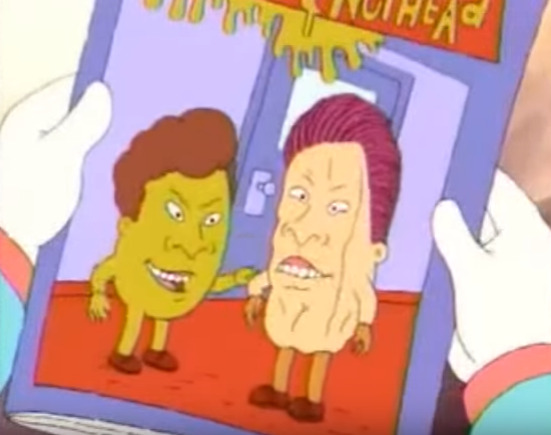








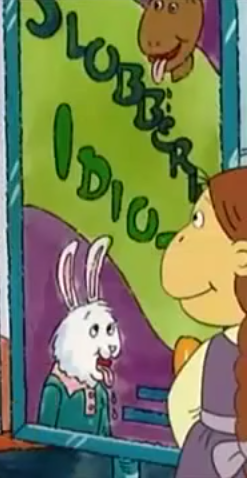

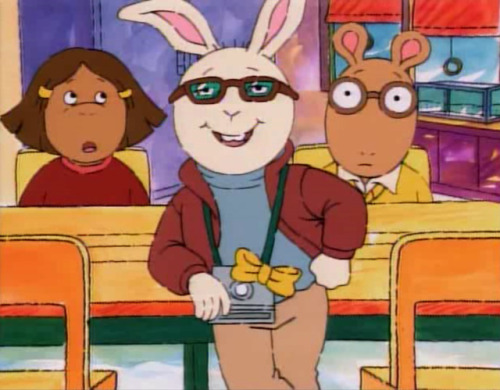
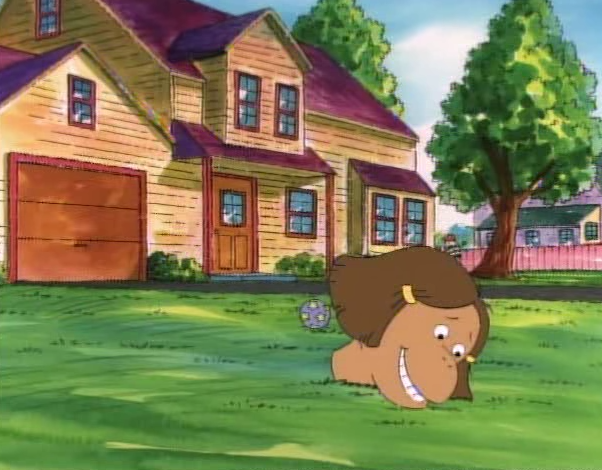
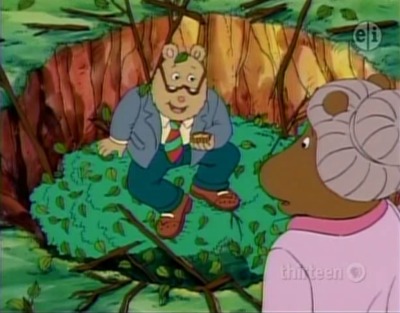

No comments:
Post a Comment